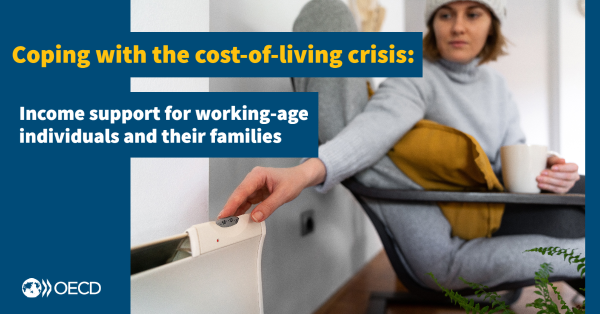Social and welfare issues
Coping with the cost of living crisis

The cost of living is climbing at an exceptionally fast pace across the OECD, with inflation in most OECD countries reaching levels not seen in the last four decades. As steep increases in the prices of energy and food cause hardship for low-income people in particular, labour market and social policies have a crucial role in protecting living standards. They are also needed to share the burden from high inflation between households, employers and governments. These short OECD policy briefs take a look at three policy areas that are key as countries respond to the cost of living crisis: minimum wages, income support and pensions.
Real wages regaining some of the lost ground
After a decline in the past two years, real wages are now growing on an annual basis in several countries but remain below 2019 levels in most. Nominal wage growth is sustained but stable. Statutory minimum wages in real terms are above their 2019 level in virtually all countries. Wages of low-pay workers have performed relatively better in many countries. As wages recover, unit profits growth has slowed down and turned negative in some countries.
Minimum wages in times of rising inflation
Despite the recent increases, minimum wages are struggling to keep up with inflation. This policy brief discusses the functioning of minimum wages across OECD countries, their role in preserving the purchasing power of low-paid workers as well as their interactions with tax-benefit systems.
- Read the brief (also available in french)
Income support for working-age individuals and their families
Cost of living support to households is a key part of government responses to high inflation. But what form should cost-of-living support take and what approaches are countries taking? This policy brief discusses the pros and cons of price caps, one-off payments and the indexation of social benefits, as well as highlights the need for timely and targeted support.
- Read the brief (also available in french)

How inflation challenges pensions
This new policy brief discusses how high levels of price inflation challenge pensions. Although the situation differs greatly between countries, a general policy response to temporary high inflation should be to fully protect at least the most vulnerable pensioners. Some low-income pensioners are suffering and need an emergency response, which may include bringing forward scheduled updates of benefits.
- Read the brief (also available in french)

Related Documents